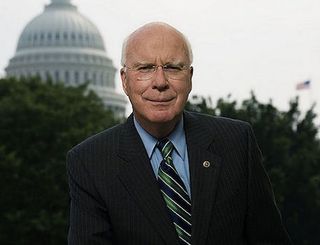Sen. Leahy: FCC Must Clarify Set-Top Proposal

Count Sen. Patrick Leahy (D-Vt.), ranking member of the Senate Judiciary Committee, among the fans of the FCC's set-top box proposal but only if it protects MVPD content and contracts.
Leahy sent a letter to Wheeler this week (there were no co-signers), saying he supported the need for competition, though he characterized the proposal as "beginning a discussion of how best to [spur meaningful set-top competition] in today's environment."
Leahy agreed that rules were needed. He said that the "patchwork of state privacy laws and Federal Trade Commission enforcement alone are not adequate" and that consumers want the option of "breaking free" of rental boxes, but he said that should not mean fewer rights for consumers and programmers.
While the letter's overall tone was supportive, it also echoed concerns MVPDs have raised about protecting content or denying functions via the forced disaggregation.
The FCC is proposing to require MVPDs to make their set-top program and data streams available to third-party devices and apps under the theory that making that content searchable alongside over-the-top content will spur a market in devices other than MVPD rental boxes, which now claim 99% of the market.
The senator told FCC chairman Tom Wheeler he thought the "unlock the box" proposal—the FCC's brand for the Notice of Proposed Rulemaking on third-party navigation devices—would "put forward meaningful opportunity to increase consumer choice" but also said it needed "important clarifications."
Chief among those are that the same "rights and obligation"—that would include privacy and copyright protections—that apply to MVPDs "must extend to third-party navigation systems," whether that be statutorily, regulatorily, or via contract.
Broadcasting & Cable Newsletter
The smarter way to stay on top of broadcasting and cable industry. Sign up below
That means, says Leahy, that "a third party navigation system should not be able to do more with the content the MVPD is providing it with than the MVPD itself is able to do under contractual agreements with programmers, since doing so could have a direct impact on the ability to produce new and diverse programming."
"The same federal privacy protections and enforcement mechanisms that apply to proprietary set-top boxes today should apply to third-party navigation systems as well," he said. "Consumers should not be forced to make the false choice between proprietary set-top boxes [MVPD rental boxes] and applications that may not meet their needs, or competitive options that do but come without all the tools available to protect and enforce their privacy rights."
On the privacy front, the FCC has proposed that if third-parties do not agree to abide by the same privacy regime that the government imposes on MVPDs, that those MVPDs don’t have to make the streams available, though MVPDs say that "trust us" approach could be hard to monitor and enforcement would be difficult and after-the-fact.
The Consumer Video Choice Coalition welcomed Leahy's support for rules.
“We applaud and commend Senator Leahy for standing up for consumers who want to unlock the box and end the cable monopoly," it said. "We agree, choice and competition, as Congress directed the FCC to implement 20 years ago, has been a long time coming. Families could save $231 per year or more if the FCC takes action."
Contributing editor John Eggerton has been an editor and/or writer on media regulation, legislation and policy for over four decades, including covering the FCC, FTC, Congress, the major media trade associations, and the federal courts. In addition to Multichannel News and Broadcasting + Cable, his work has appeared in Radio World, TV Technology, TV Fax, This Week in Consumer Electronics, Variety and the Encyclopedia Britannica.

